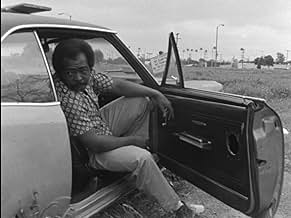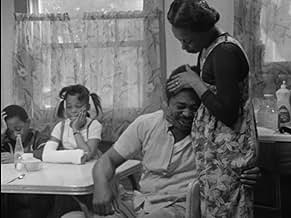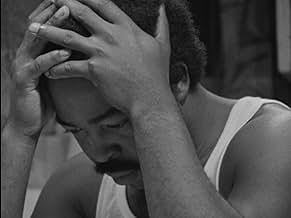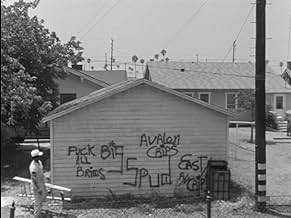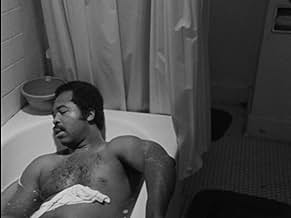Agrega una trama en tu idiomaA dramatic look into the life of a family in Watts.A dramatic look into the life of a family in Watts.A dramatic look into the life of a family in Watts.
- Premios
- 4 premios ganados en total
- Dirección
- Guionista
- Todo el elenco y el equipo
- Producción, taquilla y más en IMDbPro
Opiniones destacadas
10tRiVi8L
Woodberry, part of the (UCLA) Film Rebellion movement along with other colleagues such as Julie Dash, constructed this documentary-like saga of life in South Central, L.A. during the early `80s. Showing an uncommon (especially at the time) subject through an avant-garde/foreign (brazilian and cuban) style comes off grandly as part of the Rebellion movement .... showing all of us that mainstream cinema doesn't (and cannot) handle every aspect of film. An extremely different, unsentimental, and pleasant experience.
This movie ends up being less than the sum of its parts - which shouldn't keep you from watching it.
Let's start with the good - indeed, great - parts. Charles Burnett's cinematography is often downright spectacular. The opening sequence, with Charlie looking for a job at the employment office and then, after he doesn't find one, walking slowly back home through the train yard, finally sitting in despair on the tracks, is rivetingly beautiful. Not a word is spoken. But every angle, every shot adds to the mood. It is just masterful. As, subsequently, is the scene of Charlie shaving, and ..., and ..., and ... In all these scenes there is no dialogue. But the black and white images, often accompanied by jazz, are remarkable, and certainly make this movie worth watching.
But then come the negatives.
First, a long sequence of slow scenes like that with no contrasting faster-paced ones eventually hangs heavy on the viewer, or at least this viewer. After the opening scene, we never really see Charlie hunting for a job again. That is unfortunate, because we come to see him as lazy/shiftless after a while. The end of the last scene really emphasizes that. A few more job hunting scenes, done with different pacing, could have given the film more variety as well as reminded us that Charles is, indeed, trying to find work to support his family. (Yes, I know, he is depressed, and that is a real issue and a debilitating one. But so is his wife, and she manages to keep on going.)
Second, the dialogue, also by Charles Burnett, often falls flat. (You can't be first-rate at everything, and Burnett is clearly a first-rate cinematographer.) Perhaps it should have been turned over to someone else. Sometimes I found it stilted and unnatural, sometimes I found it preachy. (The scene in the barber shop is a good example, as is the scene early on with the men sitting around another table talking about ways to make some money.) Sometimes I just wished Charlie (the male lead) had been more honest with his wife. The long scene in the kitchen where he refuses to admit his infidelity to his wife is full of clichés and really leaves him looking like a scumbag. I doubt that was the intention of those making the film.
The acting here is fine to very fine. Nate Hardman expresses so many emotions with just a few glances and gestures, as when he looks at his kids in the kitchen after he gets home from a failed attempt at job hunting and so clearly feels like a failure to them, so clearly is ashamed.
Billy Woodberry's direction is masterful in the wordless slow scenes. He knows just what to show, and how long to show it. If he was telling his actors where to go and how to position themselves, he did a great job. It's very definitely a shame that he did not get to hone his very considerable skills through a string of subsequent films, and so learn to introduce a little variety.
Let's start with the good - indeed, great - parts. Charles Burnett's cinematography is often downright spectacular. The opening sequence, with Charlie looking for a job at the employment office and then, after he doesn't find one, walking slowly back home through the train yard, finally sitting in despair on the tracks, is rivetingly beautiful. Not a word is spoken. But every angle, every shot adds to the mood. It is just masterful. As, subsequently, is the scene of Charlie shaving, and ..., and ..., and ... In all these scenes there is no dialogue. But the black and white images, often accompanied by jazz, are remarkable, and certainly make this movie worth watching.
But then come the negatives.
First, a long sequence of slow scenes like that with no contrasting faster-paced ones eventually hangs heavy on the viewer, or at least this viewer. After the opening scene, we never really see Charlie hunting for a job again. That is unfortunate, because we come to see him as lazy/shiftless after a while. The end of the last scene really emphasizes that. A few more job hunting scenes, done with different pacing, could have given the film more variety as well as reminded us that Charles is, indeed, trying to find work to support his family. (Yes, I know, he is depressed, and that is a real issue and a debilitating one. But so is his wife, and she manages to keep on going.)
Second, the dialogue, also by Charles Burnett, often falls flat. (You can't be first-rate at everything, and Burnett is clearly a first-rate cinematographer.) Perhaps it should have been turned over to someone else. Sometimes I found it stilted and unnatural, sometimes I found it preachy. (The scene in the barber shop is a good example, as is the scene early on with the men sitting around another table talking about ways to make some money.) Sometimes I just wished Charlie (the male lead) had been more honest with his wife. The long scene in the kitchen where he refuses to admit his infidelity to his wife is full of clichés and really leaves him looking like a scumbag. I doubt that was the intention of those making the film.
The acting here is fine to very fine. Nate Hardman expresses so many emotions with just a few glances and gestures, as when he looks at his kids in the kitchen after he gets home from a failed attempt at job hunting and so clearly feels like a failure to them, so clearly is ashamed.
Billy Woodberry's direction is masterful in the wordless slow scenes. He knows just what to show, and how long to show it. If he was telling his actors where to go and how to position themselves, he did a great job. It's very definitely a shame that he did not get to hone his very considerable skills through a string of subsequent films, and so learn to introduce a little variety.
A landmark film, formally and emotionally pitch-perfect, deceptively modest yet a small-scale domestic study with far wider ramifications, 'Bless their Little Hearts' has deliberately little in the way of plot. We witness Charlie Banks (Nate Hardman) in what appears to be a long-standing routine of unemployment and piece work, the tensions in his marriage to Andais (Kaycee Moore), and the way both parents take out their frustrations on their children. (A particularly painful scene has Charlie castigate his son for not trimming his nails and appearing like a 'girl' or 'sissy'). There's little narrative 'progression' per se: Charlie takes up bits of piece-work (scything grass, painting over Crips graffiti), conducts an extra-marital affair. A lengthy fight with Andais over the affair might, in another film, have been a central or event climactic point. Here, within a matter of scenes, Charlie's back at home, the incident apparently forgotten or at least not talked about, and the routine begins again. Taking up his fishing rod--a memorable scene sees him unpicking the tangled threads when he can't sleep at night--it seems that he's taken up fishing as an attempt to recapture the past, to find some sort of solace. But it turns out that he and his friends are engaging in a money-making scheme, trying to sell fish at roadside to drivers in passing cars. Charlie sits off to the side, smoking and staring off-camera, before walking away from the group towards distance houses: as in the opening scenes, where he wanders home from the welfare office via the railroad tracks, his walk is both purposeful and purposeless, heading somewhere but with no particular place to go. And there the film simply ends.
Woodberry has described the film as "just blues and Brecht". As a write-up for a showing of the film at BAMPFA notes, this is more than just a simple put-down: Woodberry shares with Brecht an emphasis on the gestus, "the seemingly insignificant action that crystallizes for the spectator a whole complex of social relations." If the perpetual condition of unemployment can barely be analysed in the structural terms that produce it, except for the gendered stereotypes of emasculation, of failing to live up to ideals of 'manhood' present in Charlie's quarrels with Andaice and with his mistress, almost every gesture in the film gives testimony to the way these lives are shaped by broader conditions of racialised precarity perhaps the more eloquent for being never directly stated. A scene in which Charlie and his friends go through alternatives to piece-work and unemployment see Charlie reject turning to robbery, not for moral reasons, but because he has a family and a jail term would take him away from them. There's at once a hardened realism, a totally clear-eyed ability to see through the moralistic and hypocritical lies fostered by white supremacist society and a near-fatalistic inability to see an altnerative. When Charlie rides past the ruins of a factory, eloquent testimony to the ravages of deindustrialisation--a scene which memorably plays in the LA Rebellion section of Thom Andersen's 'Los Angeles Plays it Itself'--we're witnessing both broader, contextual illustration and explanation for the entire social situation we've witnessed in claustrophobic miniature throughout, and the near-incidental detail that simply passes the protagonist by on a car-ride home from day labouring, all with no words or externally-imposed explanatory detail. Such a scene is typical of the way the film at once allegorizes and refuses to give up the particularity of the lives we witness on screen. The characters are not heroic exemplars; they are not card-board cut outs; they are not existentialist heroes; they are not objects of pity or scorn one level down from the spectator; they simply are. As in Charles Burnett's 'Killer of Sheep', the film it most closely resembles (Burnett indeed wrote the script and served as cinematographer), music serves the function of the Brechtian chorus, interrupting the action more than illustrating it; it points up the low level misery we see on screen and it provides consolation. The historical nature of the blues and jazz we hear on screen says more than both words and image. It functions as far more than Hollywood soundtracking for the purposes of background, barely-noticeable filler or manipulative emotional guidepost. But it also differs from the hip use of contemporary song in the new Hollywood (exemplified by the Scorsese-Tarantino lineage). We hear both history and the present, how history repeats itself, both how little and how much has changed. Key instances include the opening scenes of Hardman in the welfare office, set to Archie Shepp's achingly fragile soprano saxophone transmutation of Bessie Smith's voice on 'Nobody knows you when you're down out', from the then-recently released 'Trouble in Mind', his second duo record with pianist Horace Parlan; and Esther Philip's voice playing over Kaycee Moore's bus ride, the camera close up on her face as she struggles to awake from sleep, staring off, as so many characters do in this film, into the middle-distance at nothing in particular. Woodberry never shows us what the characters are thinking or feeling at these moments through hackneyed devices like explicatory dialogue or voiceover. Distance is maintained with the refusal to put words in mouths, bridged by the intimate sadness of the music, specific yet archetypal. Woodberry emphasizes that these songs, too, can be cut short, often breaking them off in the middle of a phrase as the screen fades to black and another scene begins. Interrupter, consolation and expression of the inexpressible, music provides the collective eloquence absent from the characters' lives, and attests to the power of survival that subsides even in the bleak normalisation of misery. Nearly forty years after it was made, with socio-political conditions little changed, such compassionate witness resonates as strongly as ever.
Woodberry has described the film as "just blues and Brecht". As a write-up for a showing of the film at BAMPFA notes, this is more than just a simple put-down: Woodberry shares with Brecht an emphasis on the gestus, "the seemingly insignificant action that crystallizes for the spectator a whole complex of social relations." If the perpetual condition of unemployment can barely be analysed in the structural terms that produce it, except for the gendered stereotypes of emasculation, of failing to live up to ideals of 'manhood' present in Charlie's quarrels with Andaice and with his mistress, almost every gesture in the film gives testimony to the way these lives are shaped by broader conditions of racialised precarity perhaps the more eloquent for being never directly stated. A scene in which Charlie and his friends go through alternatives to piece-work and unemployment see Charlie reject turning to robbery, not for moral reasons, but because he has a family and a jail term would take him away from them. There's at once a hardened realism, a totally clear-eyed ability to see through the moralistic and hypocritical lies fostered by white supremacist society and a near-fatalistic inability to see an altnerative. When Charlie rides past the ruins of a factory, eloquent testimony to the ravages of deindustrialisation--a scene which memorably plays in the LA Rebellion section of Thom Andersen's 'Los Angeles Plays it Itself'--we're witnessing both broader, contextual illustration and explanation for the entire social situation we've witnessed in claustrophobic miniature throughout, and the near-incidental detail that simply passes the protagonist by on a car-ride home from day labouring, all with no words or externally-imposed explanatory detail. Such a scene is typical of the way the film at once allegorizes and refuses to give up the particularity of the lives we witness on screen. The characters are not heroic exemplars; they are not card-board cut outs; they are not existentialist heroes; they are not objects of pity or scorn one level down from the spectator; they simply are. As in Charles Burnett's 'Killer of Sheep', the film it most closely resembles (Burnett indeed wrote the script and served as cinematographer), music serves the function of the Brechtian chorus, interrupting the action more than illustrating it; it points up the low level misery we see on screen and it provides consolation. The historical nature of the blues and jazz we hear on screen says more than both words and image. It functions as far more than Hollywood soundtracking for the purposes of background, barely-noticeable filler or manipulative emotional guidepost. But it also differs from the hip use of contemporary song in the new Hollywood (exemplified by the Scorsese-Tarantino lineage). We hear both history and the present, how history repeats itself, both how little and how much has changed. Key instances include the opening scenes of Hardman in the welfare office, set to Archie Shepp's achingly fragile soprano saxophone transmutation of Bessie Smith's voice on 'Nobody knows you when you're down out', from the then-recently released 'Trouble in Mind', his second duo record with pianist Horace Parlan; and Esther Philip's voice playing over Kaycee Moore's bus ride, the camera close up on her face as she struggles to awake from sleep, staring off, as so many characters do in this film, into the middle-distance at nothing in particular. Woodberry never shows us what the characters are thinking or feeling at these moments through hackneyed devices like explicatory dialogue or voiceover. Distance is maintained with the refusal to put words in mouths, bridged by the intimate sadness of the music, specific yet archetypal. Woodberry emphasizes that these songs, too, can be cut short, often breaking them off in the middle of a phrase as the screen fades to black and another scene begins. Interrupter, consolation and expression of the inexpressible, music provides the collective eloquence absent from the characters' lives, and attests to the power of survival that subsides even in the bleak normalisation of misery. Nearly forty years after it was made, with socio-political conditions little changed, such compassionate witness resonates as strongly as ever.
There's an almost documentary feel to this short drama that follows the "Banks" family who are struggling to make ends meet. That's basically because husband/father "Charlie" (Nate Hardman) is habitually unemployed. This puts the strains on his wife "Andais" (Kaycee Moore) and their relationship whilst he imposes a very strict, masculine, discipline on their three children. There is a real paucity of dialogue in this as the intimately photographed imagery is left to show us the relentless mundanity of their lives. "Charlie" is not a nasty or violent man, but he is set in his ways and has no intention of straying from his own path - however inconsistent that may be with would be employers or his children who are, slowly but surely, beginning to show traits of adulthood and choice that he doesn't especially like. He is also not averse to playing on the other side of the blanket. There's a complex relationship going on here between the couple and Moore plays her part strongly. "Andais" is frustrated and disappointed with their lot in life, but is stoic enough to lose her temper but occasionally with a "Charlie" that she clearly loves, but finds exasperating at times. It's an observation of a snippet from their timeline. We join mid-flow and we leave in a similarly inconclusive fashion which, again, adds some realism to this depiction of life for an African American man whose predicaments and options are exclusively made on what he sees are his own terms.
"Well if you can see what I'm going through, why are doing this to me?"
This is a rather somber film about a black family in Los Angeles struggling because the father can't find steady work, and it succeeds because of its simple honesty and realism. It doesn't rely on plot devices aimed at garnering pity, and it doesn't create needless melodrama. We simply see these characters for who they are, a man with a growing sense of emasculation by the world, and his wife who is struggling to do everything around the house with their kids and keep the family afloat. Things come to head when she realizes that he's been seeing an old girlfriend, and not bringing all of the money he does earn home to his family.
The 9-minute argument the two have in the kitchen at that point is easily the highlight of the film. Kaycee Moore is simply fantastic in this scene, and is such a natural at channeling the frustrations and anger of her character. It's a performance that I wish was more widely known and recognized ("I'm tired!"). It's also wonderful that we see quite a bit of her character's point of view in this film, as someone who works, cleans the house, manages the finances, and is as supportive as possible to her husband.
Nate Hardman is also solid as the husband, and it's to the film's credit that he's not a completely virtuous character and we have conflicting feelings about him. In addition to the big moments, we see how small frustrations and the economic pressure boil over in his relationship with his kids and wife. The supporting performances are quite as good as well, most notably the uncredited barber who gives him pragmatic advice about getting a job, which felt completely authentic. The direction from Billy Woodberry in what was his master's thesis at UCLA (wow!) is wonderfully restrained, and it's a damn shame that he had so few opportunities after this debut.
This is a rather somber film about a black family in Los Angeles struggling because the father can't find steady work, and it succeeds because of its simple honesty and realism. It doesn't rely on plot devices aimed at garnering pity, and it doesn't create needless melodrama. We simply see these characters for who they are, a man with a growing sense of emasculation by the world, and his wife who is struggling to do everything around the house with their kids and keep the family afloat. Things come to head when she realizes that he's been seeing an old girlfriend, and not bringing all of the money he does earn home to his family.
The 9-minute argument the two have in the kitchen at that point is easily the highlight of the film. Kaycee Moore is simply fantastic in this scene, and is such a natural at channeling the frustrations and anger of her character. It's a performance that I wish was more widely known and recognized ("I'm tired!"). It's also wonderful that we see quite a bit of her character's point of view in this film, as someone who works, cleans the house, manages the finances, and is as supportive as possible to her husband.
Nate Hardman is also solid as the husband, and it's to the film's credit that he's not a completely virtuous character and we have conflicting feelings about him. In addition to the big moments, we see how small frustrations and the economic pressure boil over in his relationship with his kids and wife. The supporting performances are quite as good as well, most notably the uncredited barber who gives him pragmatic advice about getting a job, which felt completely authentic. The direction from Billy Woodberry in what was his master's thesis at UCLA (wow!) is wonderfully restrained, and it's a damn shame that he had so few opportunities after this debut.
¿Sabías que…?
- TriviaIn 2013, this film was selected by the Library of Congress for preservation in the United States National Film Registry for being "culturally, historically, or aesthetically significant".
- ConexionesFeatured in Los Angeles Plays Itself (2003)
Selecciones populares
Inicia sesión para calificar y agrega a la lista de videos para obtener recomendaciones personalizadas
Detalles
- Tiempo de ejecución1 hora 20 minutos
- Color
- Mezcla de sonido
Contribuir a esta página
Sugiere una edición o agrega el contenido que falta

Principales brechas de datos
By what name was Bless Their Little Hearts (1983) officially released in Canada in English?
Responda

